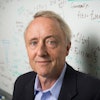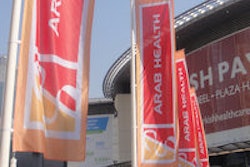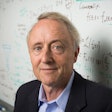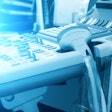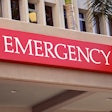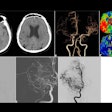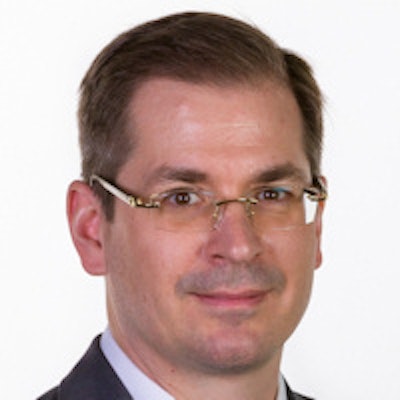
DUBAI - The capital of the United Arab Emirates (UAE), Abu Dhabi, is fast becoming a magnet for imaging diagnostic specialists searching for lucrative career opportunities away from home. So much so that the Cleveland Clinic was swamped with thousands of applications for 175 positions at a new hospital it built in the city.
Cleveland Clinic Abu Dhabi, a 364-bed multispecialty hospital modeled on the Cleveland Clinic in Ohio, reported that a staggering 5,500 doctors applied for the 175 available positions at the hospital when it began a recruitment drive back in 2014. With many successful candidates having to navigate up to 40 intensive interviews, only a lucky -- or remarkably persistent -- few made it home with the golden ticket.
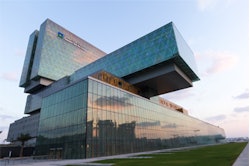 Cleveland Clinic Abu Dhabi, a 364-bed hospital modeled on the Cleveland Clinic in Ohio.
Cleveland Clinic Abu Dhabi, a 364-bed hospital modeled on the Cleveland Clinic in Ohio.Naturally, the prospect of a lifestyle change makes Abu Dhabi an attractive proposition for relocation. However, the opportunity to "create something beautiful with a relatively blank slate" was also high on the agenda for the innovators searching for a rare opportunity to join a medical facility of this caliber, according to Dr. Marc Harrison, chief of international business development at the Cleveland Clinic.
One of the many U.S. natives to make the journey to the oil-rich emirate was Dr. Andrew Rivard, who, accompanied by his wife, took up a new position as head of cardiac imaging at Cleveland Clinic Abu Dhabi in April 2015. AuntMinnie.com caught up with Rivard at this week's Arab Health 2016 meeting in Dubai, where he gave two presentations on cardiac imaging.
Journey to the east
Rivard ran across a job opening at Cleveland Clinic Abu Dhabi several years ago, when he was head of the cardiac imaging program at the University of Mississippi, and first asked his wife about the posting. Although she encouraged him to apply, it took him a long time to decide on relocating to Abu Dhabi.
Having grown up in the U.S., with no experience of working or living outside of the country, his feelings about relocating were based only on a speculation of what it might be like. "I had no idea how nice it could be," Rivard said, describing his new residence in Abu Dhabi as having many advantages.
Originally, Rivard had aspirations to be a cardiothoracic surgeon. However, after two years of residency, he decided to redirect his training to pursue cardiac surgical research in another environment, where he developed new technologies for cardiac transplantation and utilized novel cardiac MR imaging techniques.
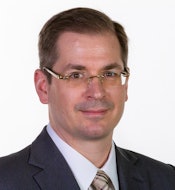 Dr. Andrew Rivard of Cleveland Clinic Abu Dhabi.
Dr. Andrew Rivard of Cleveland Clinic Abu Dhabi.Four years later, he went on to pursue diagnostic radiology at the University of Florida, where he finished his training in 2000; he describes that point as the beginning of his journey to Abu Dhabi.
Now, as head of cardiac imaging at Cleveland Clinic Abu Dhabi, Rivard's workday is entirely centered on putting the patient first.
"This is exciting work, and I get to meet patients who appreciate getting the best possible care in cardiovascular imaging," he said. Rivard works with caregivers across multiple disciplines to develop the necessary elements and organizational structure to provide a smooth and effective patient-care pathway.
"The result of this process is high-quality imaging, allowing for diagnoses that are effectively communicated to other clinicians, enabling them to make informed critical patient-care decisions," Rivard said.
He feels that both regionally and abroad, radiology is undergoing a seismic change toward putting the patient first; a change resisted by some radiologists who perceive themselves as the "doctor's doctor," with a focus on sending reports directly back to referring physicians.
The American College of Radiology (ACR) and others have recognized that such a focus is unsustainable, and that quality-based reimbursement models need to incorporate an integrated service environment, patient-focused care, clinical decision support, and actionable media-rich reporting.
This will require that radiologists either step outside the reading room to meet patients, or invite them inside to view and discuss their images, Rivard said. This personal interaction with patients and their families provides verbal communication that is augmented visually, which is important because images convey an enormous amount of information, he added.
According to Rivard, a unique part of the radiology practice at Cleveland Clinic Abu Dhabi is the development and utilization of patient-care pathways, standard operating procedures, best practice guidelines, and patient satisfaction questionnaires.
"We recently developed a guideline for patients with acute chest pain symptoms that incorporates a CT coronary angiogram done in the emergency department to triage patients into three categories: normal, needs risk-factor modification, or should go directly for a procedure," he explained.
"The use of new technology is a significant benefit to the patient by shortening the time to diagnosis and providing a clear answer to whether or not the chest pain is life-threatening," he said.
While Rivard and his colleagues continue their work at Cleveland Clinic Abu Dhabi, the many wonderful and nuanced cultural facets he is still discovering about the UAE never fail to marvel.
"My personal favorite site is the magnificent Sheikh Zayed Grand Mosque in Abu Dhabi ... also, the Rub' al Khali [Empty Quarter] is worth the drive to see the enormous sand dunes," he said.



